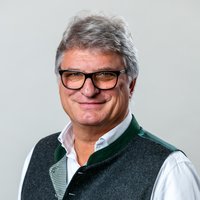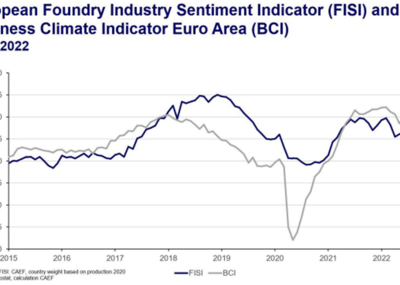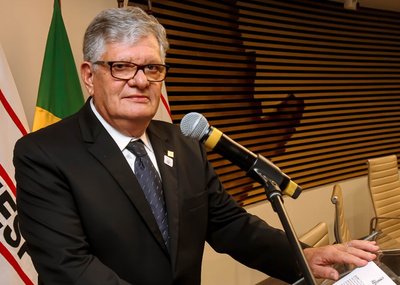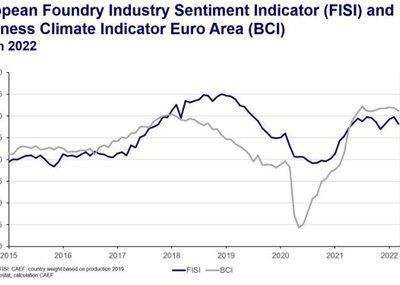Casting of aluminium components is one of the most important production processes, both technologically and economically, in lightweight automotive engineering – true now, and in the future, too. The percentage of aluminium castings found in a modern car has increased continuously during the past 50 years.
After years of unceasing growth, production figures fell, for the first time in 50 years (with the exception of 1994/95 and 2008/09), as from the 4th quarter of 2018. Since then, a large number of occurrences (CO2 discussions/transformation in the automotive industry, Corona, war in Ukraine, etc.) have resulted in the failure of any sustained reversal of this trend. On a long-term view, it can be assumed that the competition for potential growth will be decided even more critically on price and on the criterion of sustainability, particularly in lightweight automotive engineering (e.g. structural components).
What strategies should the industry therefore pursue, in view of this difficult starting point? An industry-specific technology based on the use of Artificial Intelligence (AI) has recently proven to be particularly promising: highly specialised AI software can support foundries in surviving against competition. Software supplier TVARIT is the innovation leader in this segment: this technology company has launched an AI software package which has been developed specifically for foundries and is already in successful use.
Thomas Fritsch (Managing Director, Foundry Planet) spoke to Johannes Messer (Foundry-Industry Consultant) and Jürgen Schmiezek (Chief Growth Officer, TVARIT) on the current situation in the foundry industry and the question of the contribution that Artificial Intelligence can make to the future of this industry.
Foundry industry in the competition of materials and processes
Question: Herr Messer, you posed the thesis recently that future competition in the field of aluminium castings would not centre so much on competition between the aluminium foundries with each other, but those aluminium castings would now be in competition with other processes and other materials. Why do you think that?
Johannes Messer: The trend toward lightweight automotive engineering is continuing unabated. Experts actually assume that this trend will become even more intensive, thanks to the transition to e‑mobility. Ultimately, vehicle weight is a critical parameter in increasing vehicle range. This is why developers focus on structural vehicle components.
Weight reductions do not necessarily mean that the parts needed will be produced in the form of aluminium castings. Other materials (steel), and also other processes (extrusion, sheet metal processes) also promise benefits. In many cases, the weight of parts produced in such materials or using such processes is only slightly higher. Technological properties are comparable, on the other hand, with the result that costs are the decisive factor.
So, what can Artificial Intelligence (AI) contribute?
Question: Herr Schmiezek, the foundry industry is undergoing fundamental changes. And now comes TVARIT, offering a new foundry technology. Do you really think that this is the right time for this?
Jürgen Schmiezek: We're not offering a new foundry technology. Instead, we've developed an industry-specific software technology, based on Artificial Intelligence (AI), which registers the up-to-date process parameters on the basis of existing processes and from that supplies totally specific recommendations for optimisation of the process for the particular machine.
So we're not actually changing the process, instead we determine in real time the relevant process parameters and configurations in each case. This includes their interactions and interdependencies with one another, and these have, correspondingly, a production-relevant influence on a specific optimisation criterion, such as product quality, for example. Then we compute for each individual parameter the optimum process setting. This at all times takes place, dynamically updated to the current production and process situation, for each component to be produced. Since the casting process is extremely complex, as a result of the number of influencing parameters (Ishikawa diagram), casting is especially suited to our technology.
This is the right time for our software, because the transformation in the automotive industry, i.e. the transition from the classical internal combustion engine to electrical propulsion systems, has now started. The trend toward lightweight engineering now offers great opportunities for the foundry industry. Our technology will help foundries to close in some cases already existing price deltas to make potential new components the industry benchmark at extremely short notice and, in particular, to achieve very quickly an extremely high process capability, process quality and process stability for new product start-ups.
Question: Is this also your view, Herr Messer?
Johannes Messer: The transformation currently taking place is a milestone in the history of the foundry industry. The risks for foundries caused by this transformation are realistic and complex, but I consider the opportunities arising to be just as great. In future, you will be able to differentiate successful foundries from less successful on the basis of their willingness to implement changes and the speed in which they accomplish this.
Question: Herr Schmiezek, you've already briefly mentioned the software technology you've developed. Could you tell us more details about the topic of Artificial Intelligence for foundries?
Jürgen Schmiezek: The term "Artificial Intelligence", or "AI" for short, is, unfortunately, very frequently misinterpreted. People get the impression that it takes place without human intelligence or that human intelligence is actually replaced. This, of course, is not the case.
AI is, in general, the ability of a system to interpret external data correctly in the particular context. In the case of camera data, for example, the system must be capable of recognising the difference between a person and a shadow. AI must learn from such data; the fact, for instance, that it's OK to drive over shadows, but not over people! And ultimately, AI must then use these perceptions to achieve, via flexible adaptation, certain targets and certain tasks, such as autonomous safe control of a vehicle, for example.
Applied to a potential foundry project, this means that, related to a desired criterion (e.g. reduction of porosity), for example, the main influencing parameters would firstly be determined in consultation with the foundry engineers. These parameters would then be compared against the parameters already known to us and contained in our technology. These are acquired directly on the machine and the interdependencies among them correlated with the various process data. This takes place with reference to the specified criterion, e.g. positive control of the microstructure of the casting for ultimate product quality.
In order to achieve practically 100 percent production-relevant reality in the accuracy of forecasts of parameter settings, we additionally combine the mathematical AI model, in a process patented by ourselves, with physical simulations (FEM). These computations require gigantic computer capacities, in view of the sheer quantity of potential combinations and correlations. Even with only twenty influencing parameters, this would result in 2.4*1018 pairs of combinations. And only using AI technology is it at all possible to evaluate such a large number of influencing parameters - as is found, inter alia, in the case of high-pressure die casting - in terms of mutual dependency and/or correlation. And all this in real time. This is the great difference compared to process optimisation as performed by humans. There, the number of influencing parameters that can be taken simultaneously into account is reduced to one to a maximum of two.
But: As in the case of classical learning, industrial AI also becomes more and more precise, the longer it learns via the in every case differing casting cycles. The result: Process parameters and recommendations for settings optimised virtually perfectly to the individual production environment. And – something which I find especially important to mention – a technology that expands and "empowers" the caster. This combination will be the key to success in the future.
Question: Herr Schmiezek, you mentioned improvement of quality as a typical example of the use of AI in foundries. Many foundries have already achieved an extremely good quality status, however. Is improvement of quality really a significant factor for the required cost benchmark?
Jürgen Schmiezek: In this respect, improvement of quality is only one approach among many. In our experience, foundries very frequently have potentials for cutting the reject rate, and thus achieving lower wastage of energy and resources. Also important are improvements of overall equipment efficiency (OEE) and the reduction of per casting energy consumption. In principle, all complex processes can be improved with the help of Artificial Intelligence. The question of which processes and which criteria are to be improved are something that each foundry must decide for itself. But we, of course, support and advise our foundries in advance for this purpose.
Johannes Messer: Yes, that's quite true! Top priority is improvement of product results (costs per component) and corporate results (EBITDA). Both are, of course, directly associated with and dependent on each other. The essential operational financial-performance indicator in foundries is OEE. Here, foundries predominantly have a poorer ranking than other industries.
In addition to cost optimisation – energy costs can be approx. 4 to 5 percent in foundries' income statements – reduction of energy consumption also has the additional incentive of CO2 reduction. CO2-neutrality is now an award criterion for many contracts and thus a "must have", particularly in the automotive industry.
Knowledge Drain and shortage of skilled workers, how can AI help?
Question: Herr Messer, a few weeks ago, you published a survey, performed by yourself, of thirty top managers from the foundry industry network. The result was that the managers stated the subjects of energy, improvement of financial performance, transformation in the automotive industry and loss of know-how as the essential challenges to the foundry industry. How do you view the topic of loss of know-how?
Johannes Messer: Loss of know-how, along with the scarcity of skilled personnel, is one of the great challenges for our industry. We noticed, some years ago, a decline in the numbers of apprentices and trainees, and we also now notice this trend, regrettably, in the case of students. In addition, the know-how bearers in many foundries are getting too old.
To actively tackle this subject, we must make the foundry industry interesting for young people again. The use of modern technologies, such as simulations, Foundry 4.0, AI, etc., will certainly not be a universal cure-all. I am convinced, however, that the use of these technologies will make a contribution. In total, the foundry industry as a whole must again take on a positive image. This is, in my opinion, the responsibility of the foundry managers.
Jürgen Schmiezek: I can only underline what Herr Messer says. The attractiveness of the image of the "caster" profession can be boosted very significantly by consistent orientation around digitally assisted and expanded production. This will include, for instance, integrated AI, "digital twins" (i.e. the digital display of production) and smart "cobots" (collaborative robots designed for direct interaction and collaboration with humans).
Industrial AI is highly capable of solving the serious challenges of "loss of know-how" effectively and, in particular, within a relatively short period of time. Valuable process and foundry knowledge can not only be effectively stored in such a technology, it can, instead, be successively expanded. Such "preserved and expanded" knowledge can then, for its part, be applied to every individual machine and thus made scalable. Not only the foundry occupation will thus be further developed, AI technology can also effectively "digitally qualify and expand" less well-trained employees.
Question: Herr Messer, Herr Schmiezek, is AI the future of the foundry industry?
Johannes Messer: AI can and will help foundries to be more successful in the long-term, and also in the short-term. The barriers to rapid and successful implementation can be found, in my opinion, less in AI technology and more in implementation within the foundries. The provision of the necessary process data and the required personnel resources will necessitate a certain input, and the foundries must be aware of that.
I personally am convinced that only those foundries will be successful that establish in their strategy and promptly and consistently implement continuous improvement programs, technology optimisation and AI as the short-term and long-term indicators.
Jürgen Schmiezek: As far as short-term success is concerned, I am more optimistic, on the basis of our experience gained from previous projects in the foundry industry. With our AI technology developed specifically for the foundry industry, we can guarantee significant savings on, for example, rejection rates and energy of more than 20 percent within three months, and thus return on investment (ROI) within less than six months.
I do, however, share Herr Messer's assessment that the provision of the necessary process parameters is challenging, in some cases. We have recognised this and have been able to co-opt experienced partners, with whom we cooperate on our projects, for this purpose. So we are able to offer foundries an extremely far-reaching service. The necessary foundry know-how must, however, come from the foundries. Here, we are not the experts.
Our experience from the more than fifty projects with foundries up to now have, in total, and referred to these topics, been extremely good, despite the in some cases extremely challenging heterogeneity of the "brownfield". The results achieved were, with respect to the minimum promised savings and the necessary project duration, better in all cases than had been agreed.
Herr Schmiezek, Herr Messer: Many thanks for this discussion.






